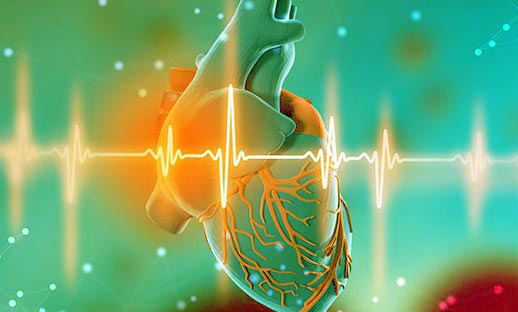Study finds that one third of recovered COVID-19 individuals exhibit subclinical ventricular dysfunction of the heart!
Nikhil Prasad Fact checked by:Thailand Medical News Team Aug 28, 2024 7 months, 3 weeks, 3 hours, 20 minutes ago
Medical News: The aftermath of the COVID-19 pandemic continues to unfold, revealing new challenges for those who have recovered from the virus. Recent research conducted by a team of scientists from the Department of Cardiology at ESIC Medical College and Hospital, Faridabad, Haryana-India, and the Department of Cardiology at Govind Ballabh Pant Institute of Post Graduate Medical Education and Research, Delhi-India, sheds light on a significant concern - ventricular dysfunction in the hearts of individuals who have overcome the acute phase of COVID-19. This
Medical News report delves into the study, which reveals that nearly one-third of recovered COVID-19 patients exhibit some form of ventricular dysfunction, raising important questions about long-term cardiac health post-COVID.
 Study finds that one third of recovered COVID-19 individuals exhibit subclinical ventricular dysfunction of the heart
The Scope of the Study
Study finds that one third of recovered COVID-19 individuals exhibit subclinical ventricular dysfunction of the heart
The Scope of the Study
The research team, led by Dr. Shekhar Kunal and Dr. Mohit Dayal Gupta, aimed to explore the subclinical dysfunction of the heart's ventricles in individuals who had recovered from COVID-19. Utilizing speckle tracking echocardiography (STE), the study focused on assessing the left ventricular global longitudinal strain (LVGLS) and right ventricular free wall strain (RVFWS) in these patients. Over a period of one year, the researchers monitored 189 subjects who had recovered from COVID-19, comparing their heart function with that of 90 healthy individuals who served as controls.
Key Findings: The Prevalence of Ventricular Dysfunction
The study's findings are striking: subclinical left ventricular (LV) dysfunction was observed in 30.7% of the patients, while right ventricular (RV) dysfunction was detected in 29.1%. This means that nearly one-third of the individuals who had seemingly recovered from COVID-19 were still experiencing some form of heart dysfunction. The researchers noted a significant difference in the LVGLS values among patients with mild, moderate, and severe COVID-19 infections. Specifically, those who had suffered more severe forms of the disease showed more pronounced ventricular dysfunction.
One of the most concerning aspects of these findings is the fact that this dysfunction was subclinical. In other words, these patients were not showing overt symptoms of heart failure or other cardiac issues, but their heart function was nonetheless impaired. This raises important questions about the potential long-term consequences of COVID-19 on heart health, particularly for those who may not be aware that their heart function has been compromised.
Long-Term Follow-Up: A Glimmer of Hope
While the initial findings may seem alarming, the study also offers a silver lining. Over the course of a year, the researchers observed a small but statistically significant improvement in both LVGLS and RVFWS. For instance, the average LVGLS improved from -19.1% at baseline to -19.9% after one year. Similarly, the RVFWS showed improvement from -23.5% to -23.8%.
This suggests that while ventricular dysfunction is a serious concern for those recovering from COVID-19, there is potential for the heart to heal over time. However, it is important to note that despite this improvement, some patients continued to exhibit reduced LVGLS and impaired RVFWS even after one year of recovery. Specifically, 6.3% of subjects still had reduced LVGLS, and 5.3% had impaired RVFWS at the end of the study period.
Correlation with Inflammatory Markers
The study also explored the relationship between ventricular dysfunction and inflammatory markers that were elevated during the acute phase of COVID-19. The researchers found a significant correlation between the levels of C-reactive protein (CRP) and interleukin-6 (IL-6) with both LVGLS and RVFWS. This suggests that the systemic inflammatory response triggered by COVID-19 may play a key role in the development of ventricular dysfunction.
Moreover, the severity of the initial COVID-19 infection and the need for hospitalization were identified as independent predictors of reduced LVGLS in recovered patients. This underscores the importance of monitoring heart function in patients who had severe COVID-19, as they may be at higher risk of long-term cardiac complications.
Clinical Implications: The Importance of Monitoring Heart Function
The findings of this study have significant implications for the clinical management of patients recovering from COVID-19. Given the prevalence of ventricular dysfunction in this population, the researchers emphasize the need for ongoing cardiac monitoring, particularly using tools like speckle tracking echocardiography. By detecting subclinical dysfunction early, healthcare providers can intervene more effectively to prevent further cardiac damage and promote recovery.
This study also highlights the importance of personalized treatment strategies for post-COVID-19 patients. Given the variability in how the virus affects different individuals, a one-size-fits-all approach is unlikely to be effective. Instead, tailored interventions that take into account the severity of the initial infection and the presence of co-morbidities may be necessary to optimize outcomes.
Conclusion: A Call for Continued Research and Vigilance
The study findings were published in the peer-reviewed journal: Indian Heart Journal.
https://www.sciencedirect.com/science/article/pii/S0019483224001652
While the research provides valuable insights into the long-term effects of COVID-19 on heart health, it also raises important questions that require further investigation. For instance, what are the long-term implications of ventricular dysfunction in COVID-19 survivors? How can we best monitor and treat these patients to prevent further cardiac complications?
As the world continues to grapple with the aftermath of the pandemic, it is clear that the journey to understanding and mitigating the long-term effects of COVID-19 is far from over. For now, healthcare providers and patients alike must remain vigilant, ensuring that those who have recovered from the virus receive the ongoing care and monitoring they need to protect their heart health.
For the latest COVID-19 News, keep on logging to Thailand
Medical News.
Read Also:
https://www.thailandmedical.news/news/covid-19-news-impact-of-sars-cov-2-on-cardiac-health-czech-republic-study-reveals-alarming-findings-on-ventricular-and-atrial-strain
https://www.thailandmedical.news/news/australian-study-using-echocardiographic-assessment-shows-that-many-post-covid-individuals-have-left-ventricular-dysfunction
